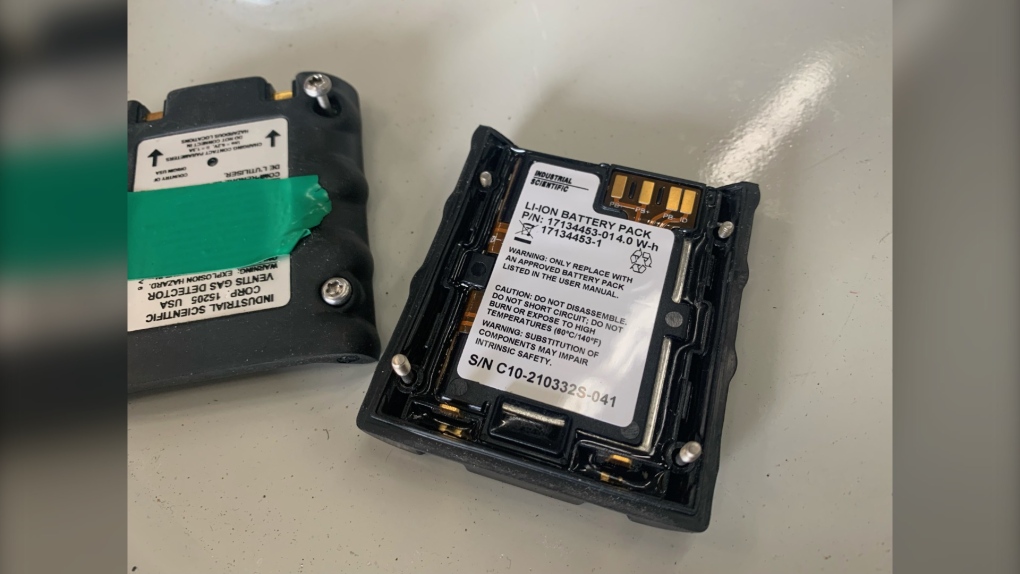Toronto fire urges caution after e-bike batteries catch fire twice in a month at same building
 A lithium-ion battery pack. (Heidi Petracek/CTV Atlantic)
A lithium-ion battery pack. (Heidi Petracek/CTV Atlantic)
Toronto Fire Service (TFS) is reminding people to be extra mindful after two fires involving lithium ion batteries occurred at the same building this month.
Late Sunday afternoon, two people were taken to the hospital for smoke inhalation after an electric bike ignited at a residential high-rise in Toronto's Yorkville area.
Just two weeks earlier, on Oct. 7, Toronto fire attended the same Toronto Community Housing building at 877 Yonge St., just north of Church Street, for a two-alarm fire, also involving an e-bike. In this case, paramedics assessed two people.
Both incidents are currently under investigation, Deputy Fire Chief Larry Cocco told CP24.com.
Cocco said that in recent years TFS has seen a notable spike in the number of calls for fires, and even explosions, involving lithium ion batteries, which are used to power smartphones, laptops, micro-mobility devices like electric scooters, e-bikes, and hover boards as well as e-cigarettes, smoke alarms, and toys among other things.
In 2022, Toronto fire responded to a total of 29 calls involving lithium ion batteries.
So far this year, the fire department has already responded to 51 incidents and there’s still more than two months to go.
Cocco said that lithium ion batteries can be useful as they pack a lot of power in a compact space, however with that concentration of energy, the risk that they could catch fire or blow up increases.
He said that people who find themselves in close proximity to lithium ion battery fires/explosions can be seriously hurt or even killed.
Since 2020, TFS has recorded one such fatality and several other injuries related to incidents involving these devices, which he underlined aren’t “inherently dangerous.”
Further, these fires can also cause significant property damage, Cocco said, pointing to one incident that caused millions of dollars in damage at a warehouse.
Some of the most common reasons why lithium ion batteries ignite are due to overheating, electrical failure, or damage, noting challenges often arise when they aren’t used properly or when they’re unrated and unaccredited, he said, adding lithium ion batteries may also experience a phenomenon called thermal runaway, when they heat up over time and ignite days or even weeks later, resulting in “rapid, violent events.”
“Do your research,” Cocco urged.
CTVNews.ca Top Stories

'Mayday!': New details emerge after Boeing plane makes emergency landing at Mirabel airport
New details suggest that there were communication issues between the pilots of a charter flight and the control tower at Montreal's Mirabel airport when a Boeing 737 made an emergency landing on Wednesday.
Trudeau appears unwilling to expand proposed rebate, despite pressure to include seniors
Prime Minister Justin Trudeau does not appear willing to budge on his plan to send a $250 rebate to 'hardworking Canadians,' despite pressure from the opposition to give the money to seniors and people who are not able to work.
Hit man offered $100,000 to kill Montreal crime reporter covering his trial
Montreal news outlet La Presse says a hit man offered $100,000 to have one of its crime reporters assassinated.
Cucumbers sold in Ontario, other provinces recalled over possible salmonella contamination
A U.S. company is recalling cucumbers sold in Ontario and other Canadian provinces due to possible salmonella contamination.
Trudeau says no question incoming U.S. president Trump is serious on tariff threat
Prime Minister Justin Trudeau says incoming U.S. president Donald Trump's threats on tariffs should be taken seriously.
Insurgents breach Syria's second-largest city Aleppo in shock offensive
Insurgents breached Syria's second-largest city Aleppo after blowing up two car bombs on Friday and were clashing with government forces on the city's western edge, according to a Syria war monitor and fighters.
Here's how thick ice needs to be to park a truck on it, according to Sask. Water Security Agency
The Saskatchewan Water Security Agency (WSA) says ice should be at least one foot (30 centimetres) thick before it's safe to drive a car or light truck on a frozen body of water.
Democratic lawmakers from Connecticut report Thanksgiving bomb threats against their homes
At least six Democratic members of Congress from Connecticut were targeted by bomb threats on their homes Thursday, the lawmakers or their offices said.
Latest updates: Tracking RSV, influenza, COVID-19 in Canada
As the country heads into the worst time of year for respiratory infections, the Canadian respiratory virus surveillance report tracks how prevalent certain viruses are each week and how the trends are changing week to week.


































